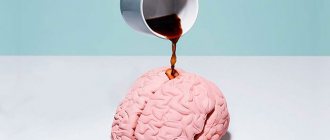Only lazy people don’t talk about the dangers of coffee, and such warnings are justified: caffeine has a powerful effect on all systems of the body. In particular, stomach pain after coffee is a very common problem. True, such complaints rarely go to the doctor if the pain is not accompanied by any other alarming symptoms.
Usually in such a situation, people simply stop drinking the drink, or turn their attention to other varieties of it, for example, they start drinking coffee with milk rather than strong black coffee.
Read on to find out why coffee can cause stomach pain and what ways to cope with this problem.
Inappropriate time to drink the drink
The first and most common reason why your stomach hurts from coffee is carelessness in choosing the time for a coffee break. Everyone knows that caffeine has a very strong effect on the body, and coffee beans contain, among other things, a large amount of acids. This “explosive” composition causes discomfort if it is consumed on an empty stomach - when mixed with gastric juice, the substances form an acid-base environment that is extremely dangerous for the gastric mucosa.
This leads to unpleasant sensations and pain, like gastritis. However, frequent drinking of coffee on an empty stomach is one of the most common causes of gastritis these days.
In addition, people with sensitive stomachs are not recommended to drink coffee in the morning, even after meals, since in this case the drink will be harmful to health.
Features of symptoms
Patients with this problem complain of aching, excruciating pain in the stomach that occurs every 5-10 minutes after drinking coffee in the morning on an empty stomach . The pain in nature resembles the symptoms of gastritis and goes away on its own within 20 minutes to half an hour. There are usually no other symptoms, but in rare cases nausea and vomiting may occur.
Treatment methods
If you are faced with a similar problem, then, of course, you should not drink coffee on an empty stomach in the future. It is also worth consulting with your doctor to determine, taking into account your age, weight and individual characteristics, an acceptable dose of coffee for you.
In order to relieve existing pain, you should not take medications - this will only harm your stomach . Medicines by themselves should not be taken on an empty stomach, and in combination with coffee they can even lead to unpleasant consequences.
It's best to have breakfast - prepare a light and healthy breakfast that will relieve pain. For example, eat a bowl of oatmeal - due to its consistency, it gently envelops the walls of the stomach, preventing them from being irritated by gastric juice, and also restores the acid-base balance.
How to drink coffee correctly so that your stomach doesn't hurt
Each situation requires an individual approach in order to retain the right to drink coffee. For some, a decrease in concentration is suitable, for others, they will start adding milk and the negative symptoms will go away.
You should follow general rules that will prevent the development of disease after prolonged use of your favorite drink:
- Do not dehydrate the body. Before and after drinking espresso, drink at least a glass of clean still water.
- After a shot of espresso on an empty stomach, you need to eat something, at least a cookie, to neutralize the hydrochloric acid that begins to be released in excess.
- Do not exceed permissible dosages. Everyone has their own. It can be determined by the presence of nausea, dizziness, and hand tremors. If these symptoms appear, it means the dosage has been exceeded. You can normalize the condition with water to gradually reduce the concentration of caffeine in the blood.
- Maintain a rest regime. The body is not able to constantly be in stress mode. The gastrointestinal tract may be the first to react.
People who suffer from some chronic diseases should be periodically examined if they consume prohibited foods or drinks in order to prevent a relapse in time.
Did you like the article? Share with your friends:
Individual intolerance to the type of coffee
Another reason why your stomach hurts after coffee is the wrong choice of drink type. A group of specialists experimentally found that some varieties and methods of frying them release more acids during cooking than others. They most often lead to stomach pain.
© shutterstock
These varieties, in particular, include the popular and high-quality Arabica, as well as any light-roasted beans, that is, those that have not been subjected to intensive heat treatment.
Features of symptoms
Pain in the stomach, aching, occurring 5-10 minutes after drinking coffee . They go away on their own within half an hour, but resume at the next similar case. You can find out that the reason is the wrong type of coffee by trying another caffeine-containing drink, for example, a portion of instant coffee.
Treatment methods
If this problem arises, it would be rational to stop drinking the wrong type of coffee and find a similar replacement for it. You can also experiment with the quantity and strength of the drink - perhaps the coffee variety is not suitable for you, but a lower concentration will not cause stomach pain.
Stomach hurts after coffee: causes, treatment, harm and benefits
Coffee is a powerful natural psychostimulant that helps millions of people cheer up and tune in to the frantic pace of modern life. In addition, recent studies confirm the benefits of this drink for the liver and cardiovascular system. However, having a stomach ache after coffee is a fairly common occurrence, which is entirely explained by the chemical composition of coffee beans.
Why does coffee make my stomach hurt?
The most important compound found in coffee beans is caffeine . According to its pharmacological properties, it is a real stimulant, that is, a substance that accelerates biochemical processes in the body. The effect of caffeine is manifested in:
- increased heart rate and blood pressure;
- facilitating breathing and reducing hypoxia (lack of oxygen in the body);
- acceleration of metabolism (including fat burning);
- increasing mental activity;
- facilitating the transmission of nerve impulses and excitation of the nervous system;
- increasing motility and secretion of the gastrointestinal tract.
It is the latter effect that causes abdominal pain after coffee. Caffeine causes a short-term spasm of the smooth muscles of the intestine, which is the direct cause of pain. Increased motility and excess mucus secretion often leads to post-coffee diarrhea (usually short-lived).
Most often, this problem is encountered by people suffering from irritable bowel syndrome. With this disease, the digestive system is very sensitive to various external and internal irritants. However, anyone can experience stomach pain from coffee , especially if you like to add milk to your drink.
Beneficial properties of coffee
Coffee beans contain over 1,200 biologically active compounds, each of which affects the human body in one way or another. Here are just a few of them:
- Amino acids are the basic structural units of proteins.
- B vitamins necessary for the normal functioning of the nervous system.
- Essential oils with antiseptic and disinfectant properties.
- Organic acids (especially chlorogenic acids) in reasonable quantities have a beneficial effect on the gastrointestinal mucosa.
- Iron is necessary for normal hematopoiesis and tissue respiration.
When drinking 1-2 cups of coffee per day (no more), the synthetic and detoxification function of the liver is normalized. The drink is especially useful for patients with liver cirrhosis and chronic hepatitis - in them, coffee additionally slows down the processes of fibrosis.
Harm of coffee to health
As stated above, the central and, at the same time, most dangerous component of coffee is caffeine. Its excessive use is fraught with:
- Hyperexcitability of the nervous system : tremor (shaking) in the hands, anxiety (even panic attacks), aggressiveness, insomnia, headaches, and even convulsions in predisposed individuals (preschool children, patients after traumatic brain injuries).
- Damage to the upper gastrointestinal tract : increased acidity of gastric juice with subsequent development of stomach ulcers. With an overdose of caffeine, pain in the upper abdomen, nausea, vomiting and a sour taste in the mouth are common.
- Changes in the cardiovascular system : tachycardia (increased heart rate over 80 beats per minute), high blood pressure, arrhythmias.
- Osteoporosis (increased bone fragility), since the magnesium contained in coffee leaches calcium from the bones.
It is important to note that all of these effects are observed only when drinking bean or ground coffee.
During the production of instant coffee (pour, pour, drink), a significant part of the caffeine, as well as many other compounds, is lost. This drink is almost completely safe for health, and instead of having a stimulating effect, it often causes slight drowsiness.
How to deal with discomfort
The best way to deal with heartburn after strong coffee is to drink a glass of cold water , especially if you drank ristretto.
If the discomfort does not go away within 2-3 minutes, you can take any antacid drug (for example, Phosphalugel). It forms a protective film on the gastric mucosa that is impermeable to acidic compounds.
These same drugs will successfully cope with pain in the pit of the stomach.
If after drinking coffee the middle of the abdomen or any other part of the abdominal cavity hurts, you can take No-Shpu. This drug will relieve spasm of smooth muscles and, thereby, eliminate pain. You can drink activated charcoal or Enterosgel to bind coffee residues in the intestines and prevent them from further disrupting the digestive system.
To normalize digestion, we recommend taking a course of Pankrenol ( Official store )
Diarrhea after coffee is much more difficult to deal with. In this case, you should simply endure the unpleasant symptom and drink enough fluid. Loose stools usually go away after 1-2 visits to the restroom. Subsequently, you should either give up coffee altogether or drink it in much smaller quantities.
Source: https://zhivotu.net/bolit-zhivot-posle-kofe/
Exceeding the recommended amount of drink
Another common reason why abdominal pain occurs after coffee is non-compliance with recommendations regarding the amount of drink and its strength. In this matter, of course, everything is very individual and depends on the functioning of your stomach, but general advice should be taken into account.
© shutterstock
So, you should not drink more than three servings a day. At the same time, in the mornings and evenings it is better to limit yourself to just one, and in the lunchtime and afternoon it is permissible to drink two.
Features of symptoms
The symptoms in this case will be similar to the previous ones: stomach pain that goes away on its own within half an hour. However, if the recommended dose is exceeded, other manifestations of the problem may appear : rapid heartbeat and breathing, sweating of the feet and palms, anxiety or agitation, rapid speech and “running” eyes. If the recommended dose is significantly exceeded, an obsessive state or panic attack may occur.
Treatment methods
If the recommended dose is slightly exceeded, you should wait out the condition - a hearty lunch and some time spent at rest will help relieve it. If the dose is significantly exceeded, it is recommended to rinse the stomach.
Gastritis and peptic ulcer
Another reason why stomach pain may occur after coffee is gastrointestinal diseases such as gastritis and peptic ulcers. They are formed due to long-term adverse effects on the body: most often the cause is either systematic poor nutrition or a person being under constant stress. In such cases, gastritis develops, and then, if the patient does not take any measures to treat the disease, an ulcer occurs.
© shutterstock
Features of symptoms
With gastritis and ulcers, pain occurs not only after coffee, but also after any meal, even a minor one.
Treatment methods
Both of these diseases require observation by a doctor, as well as adherence to a special diet. Coffee in small quantities is allowed only in mild forms of gastritis , however, in more complex cases, as well as in case of peptic ulcer disease, the drink is completely excluded from the patient’s diet.
What are the consequences of excessive coffee drinking in adults?
When asked whether coffee can cause stomach pain if you drink it regularly and in large quantities, doctors answer in the affirmative. Despite some sources of information with data on the carcinogenic properties of the drink, which, as a useful antioxidant, can protect against a number of modern diseases, the harm from it is more tangible and obvious.
Harvard scientists, for example, are confident that coffee provokes the development of cancer:
- in the stomach;
- bladder;
- pancreas;
- liver.
Research conducted on this topic has only confirmed the assumptions - coffee is harmful to the body if taken regularly in large quantities and at the wrong time.
Sooner or later, uncontrolled love for the drink will lead to:
- to depletion of body reserves;
- development of fatty degeneration;
- gastrointestinal diseases, etc.
The drink will cause significant harm to the body’s metabolic processes, primarily due to aggravation of the situation with the absorption of a number of useful microelements, including calcium. This point should be taken into account by people undergoing treatment with drugs containing calcium. In such cases, you should allow yourself coffee only an hour before taking medications and 2-3 hours after. Neglecting this rule will lead to the binding of caffeine with calcium into insoluble compounds that cannot be absorbed by the body.
Which doctor should I contact?
We looked at the harm caused by coffee, the causes of stomach pain, and now it’s time to tell you which specialist you should go to in this case. So:
- If your stomach hurts after coffee, you should visit a gastroenterologist.
- If this is not possible, or you are not sure of the causes of pain, visit a general practitioner - therapist.
- If you want to know how much coffee you should drink, as well as advice on other nutrition-related issues, consult a nutritionist.
© shutterstock











